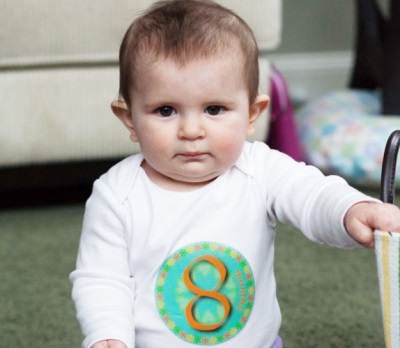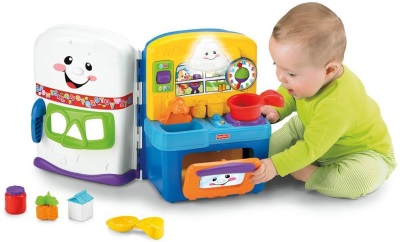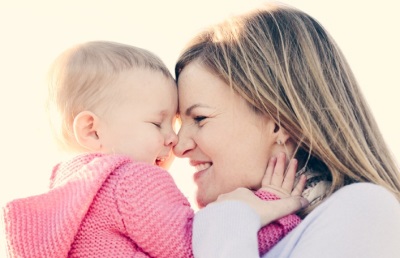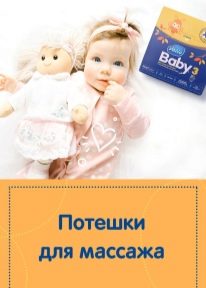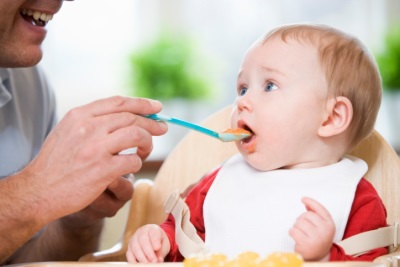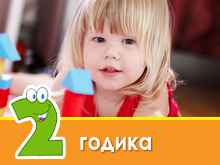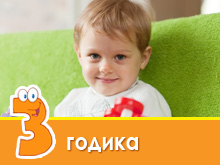Child development at 8 months
Eight-month-old kids are very active, they move a lot and learn new spaces with interest, because at this age they can already crawl around. What else has the karapuz learned by the age of 8 months, what new skills are already pleasing parents and how can adults help in the development of an infant of this age?
Physiological changes
- The teething period continues, and their appearance is very individual. Someone in 8 months still does not have a single tooth, or the first incisor has just appeared, and someone is already trying to gnaw biscuit four teeth.
- The growth rate of the child slows down a bit, which is associated with increased physical activity of the baby. The muscles of the crumbs are already developed so that they allow the baby not only to roll over and sit, but also to stand and crawl.
- The baby’s chair has become more shaped and has little resemblance to the stool of the baby, which is exclusively breastfed. It has a mild odor, and the frequency of bowel movements is usually 1 time per day.
- The memory of the child develops and holds the latest events. Thanks to the improvement of memory, the baby is able to repeat the actions of the parents, to recognize familiar objects, heard pies, close people.
Physical development
In the eighth month of life, the baby adds about 550 grams and becomes 1.5 centimeters higher on average. The chest circumference and head circumference increase each by 0.5-1 cm.
Although the pace of development of each child is individual, on the basis of measurements of a large number of children of a certain age, physicians determined the average value, as well as the limits of normal indicators of physical development. Deviation from them causes wariness and is the cause of a detailed examination of the baby. The main parameters for babies 8 months are presented in this table:
Indicator | 8 months average | Boys in 8-9 months | Girls 8-9 months |
Weight | 7900-8600 g | 6900-10700 g | 6300-10200 g |
Growth | 68.7-70.6 cm | 66.2-75 cm | 64-73.5 cm |
Head circumference | 43.4-44.5 cm | 42-47 cm | 40.7-46 cm |
Chest circumference | 45.7-46.4 cm | 43.5-49.9 cm | 43.7-48.3 cm |
The fact that the child should be able to 8 months, see in the video of Larisa Sviridova.
What baby can?
- The baby of 8 months is very active physically, able to sit down, lie down, stand up (at the same time pull up on the support), crawl pretty quickly, and also cross the items.
- The kid devotes a lot of time to learning toys and constantly trains his own hands. He can freely shift one toy into another handle, and if the object falls out of his hand, he will look for it. The child likes to roll the ball, click on different buttons, scroll through the pages of books.
- The babble of an eight-month-old baby already has intonation, which the baby adopted from its parents. The crumb repeats the same syllables many times, so parents constantly hear from the baby "ma-ma-ma" or "ba-ba-ba."
- Children of this age are very cheerful, happy to other kids, and adult strangers are wary. If mom leaves somewhere, the eight-month-old toddler is very upset. When a child fails, the crumb will be upset, and my mother's praise will be very happy.
- A child may show a familiar object when asked where, where?Also, the baby has already learned at the request of waving a hand, doing “ladies” and other actions that his parents taught him earlier. The baby really likes games in which actions are repeated.
- A baby of 8 months not only eats from a spoon and even tries to do it on his own, but also takes firm food (such as baby cookies) in the pens, biting off pieces of it.
Although all children develop at their own pace and some skills may acquire earlier than their peers, and some - later than other children of the same age, however, there are skills that the baby must necessarily have in 8 months. You should be alerted if the crumb:
- Does not sit down.
- Does not crawl back or does not try to crawl at all.
- Do not try to get up from the support.
- Can not stand for a few seconds, holding with both hands.
- Can not hold the toy in their hands.
- Not enough proposed toy.
- Does not shift a toy from one handle to another.
- Does not pronounce syllables.
- Does not listen when he hears adult talk.
- Does not show any emotions.
Classes for development
- If the baby has not yet mastered crawling on all fours, train the baby in the water. While bathing, put your baby on the bottom of the empty bath and turn on the water so that it slowly fills the bath. The water level will rise and will become an incentive for raising the baby on the elbows and knees. With this exercise, it is important to ensure that the child does not get drunk water.
- Another way to teach a child to crawl on all fours is to walk on his hands. Raise the baby's legs so that the crumb gets on the handles. Next, rock the little guy back and forth. As soon as the baby gets tired, the exercise should be stopped.
- To improve fine motor skills, suggest the little one to touch various objects, toys with buttons and latches, boxes with lids, rings of pyramids, soft books and many others.
- Since a child at 8 months of age in games copies the actions of adults, mom should be shown how to handle new toys. Roll the car with the child, shake the doll, tap the drum, and let the baby repeat.
- Offer the crumbs to play with several homogeneous objects, for example, with cubes of different colors, balls, pyramid rings. By folding and scattering such items, the child will know the connections between them.
- Build a small pyramid from cubes and show the baby how it can be broken up with the help of a rolling ball.
- Consider family photos with your baby and ask to show your close people and the child. The child will like to find himself in the photo.
- Turn on the music often and dance with the baby. Let it be motives with a different rhythm - both classical melodies, and children's songs, and songs of modern performers.
- Practice your baby’s balance by raising your baby and lowering it. You can also go around with the baby.
- Make for the child a shelf for books to which the baby can reach. Fill this shelf with bright children's books and let the karapuzu choose for himself a book to read.
- Play with the crumbs in the bathroom. Let the kid move the floating toys, clap his palms on the surface of the water, take water in the molds, pour from one container to another.
- Allow the crumbs to play with kitchen utensils, but at the same time, give the baby only safe items - ladles, containers, lids and others.
- Also, the baby will enjoy playing with this phone, which for this should be disconnected from the network. Give the toddler a phone and let him "talk."
- While walking, pay attention to the different sounds of the airplane, car, bird, dog. In this case, call the sound source.
- Keep your baby's interest in animals. Purchase plastic or rubber animals and name them, and imitate their voice.Show the crumbs of animals in books and on the street.
- Give the baby a wooden spoon and a few items to beat. So the child will understand that objects differ not only in appearance, but also in the sound produced.
- In the eyes of the toddler hide the toy, covering it with a blanket, and then offer the crumbs to find it.
Care
In the morning, as before, the baby is held hygienic measures. These include washing, brushing your teeth, planting on the pot, rinsing. Every evening, the baby is bathed while playing fun with toys that can swim. In addition, during the day the child should periodically wash the hands, because the crumb creeps and touches various objects. Changing the diaper, the child must be washed under running water.
For hardening child 8 months continue to use air and sunbathing, daily walks, airing the room, washing, walking on a wet towel. In addition, crumbs every day do massage and gymnastics strengthening muscles. Eight-month baby for a short time can be seated in a walker or in the arena.
Nikolay Nikonov - the leading doctor and massage therapist in Russia in the next video shows how to do a massage for the full development of a child in 8 months.
Daily regime
The eight-month peasant sleep less and less, but stays awake, studying with interest the world around us, longer and longer. The total sleep time of a child of this age is about 15 hours, while the baby sleeps up to 10 hours at night, and during the daytime, most 8-month-old children have two dreams of 1.5-2 hours each.
Walking with the baby at the age of 8 months is still advised twice a day - in the morning (about 11-13 hours) and after lunch (about 15-17 hours). Many children continue to sleep during their walks, but quite a few babies no longer sleep during their whole time on the street, and for a certain period they study nature and consider everything around.
Feeding an eight-month-old baby provides for 5 meals with a pause between them of about 3.5-4 hours. To determine the daily volume of food that a child needs, the weight of the crumbs is divided by 9. On average, a child of eight months receives from 1000 to 1200 ml of food per day and approximately 200-240 ml per feeding. Read more in the article about baby menu at 8 months.
Breast-feeding on demand at this age, 6-8 feedings are provided during the day and about 6 feedings at night. The volume of complementary foods increases and is presented in the baby’s menu with vegetables, fruits, milk-free cereal, vegetable oil, meat, fruit juice, butter, crackers and cookies.
Bottle-fed babies receive the mixture in the morning feeding, as well as the last feeding before bedtime. In the rest of the time, the menu of the artificial-krohi is formed from complementary foods. In comparison with breastfed babies, their diet is more expanded - sour-milk drinks, cottage cheese and yolk are added to it. Porridge for an artificial baby is already boiled with milk, and the volume of the majority will be higher than that of a baby with breast feeding.
Typical day
Every new day with an eight-month baby brings a lot of interesting and fun moments. It is clear that the regime for each of the children of this age will be different, but we offer an approximate version of the daily routine, which may be 8 months for babies:
6: 30 | Spilling. The first feeding, in which the child receives mother's milk or a mixture. |
7: 00 | Hygiene procedures. |
7: 30 | Wakefulness |
9: 00 | Gymnastics. |
10: 00 | The second feeding, in which the breastfed children are given gruel with butter, and the yolk is additionally offered to the little artificials. |
10: 30 | Period of wakefulness. |
11: 30 | Walk, during which the crumbs have the first daytime sleep in the fresh air. |
13: 30 | The third feeding, during which babies of any type of feeding receive vegetable puree with meat purée and vegetable oil, as well as wheat bread and fruit juice. |
14: 00 | Wakefulness period and developing games. |
15: 00 | Walk, during which the child has a second day's sleep in the fresh air. |
17: 30 | The fourth feeding, which in breastfed babies will include fruit puree, cookies and breast milk, and in bottle-fed infants - a fermented milk drink, fruit puree, cottage cheese and biscuits. |
18: 30 | Waking and quiet games. |
20: 30 | Bathing. |
21: 00 | The fifth feeding, during which the child receives mother's milk or formula. Preparing for night sleep and laying down. |
Night time | Breastfeeding babies in a dream are applied to the breast up to 6 times, and babies-masters at this age do not wake up for feeding. |
Diversify your day games with the child according to the method of "Little Leonardo", which you can see in the video Teplyakova O. N. - an expert on intellectual development.
Frequent problems
- Fear of parting with mom. Children of 8 months are beginning to be afraid to let their mother away from themselves and are very worried about parting with her. In addition, other fears may appear at this age, for example, a child may be frightened by the loud sounds of household appliances. Show your baby the source of the sound so that it stops being intimidating.
- Refusal of prikorma. A baby may refuse to try a new food if the dish does not like it with its consistency, taste or temperature. Perhaps the baby has not had time to get hungry, or it is very hot in the room. In any case, no need to insist. Offer food to your baby a little later.
- Restless sleep Kids of eight months due to physical activity and overexcitement can fall asleep poorly and their night rest is disturbed. To avoid problems with a night's sleep, eliminate active games in the evening, have a relaxing massage before bedtime, read a small book.
- Painful teething. The appearance of teeth without pain and discomfort is quite rare. In many babies, teeth are cut with painful sensations, changes in stool, fever, moods, and other negative manifestations. Help the baby can cooled special toys that can be nibbled. To get rid of pain, special gels are used, and at a temperature - drugs with antipyretic effect.
- Allergy to lure. As the menu of eight-month-olds expands, there is always the risk of a reaction to a new product. Such a reaction may be manifested by diarrhea, skin rashes, runny nose, constipation, colic, redness of the eyes and other symptoms. Try to acquaint the child of this age only with safe products that rarely cause allergies. While the child should not be given red berries, tomatoes, cocoa, citrus fruits, soy products, and with the introduction of milk, eggs and Chicken should be very careful.
Tips for parents
- Since the 8-month-old baby is already actively exploring the apartment, crawling everywhere, you should ensure the safety of the baby. The toddler does not yet understand the risks and dangers, so the task of the parents will be to eliminate from the child’s path toxic substances, tiny and breakable objects, as well as everything sharp and cutting. Hide sockets, hide the sharp corners of the furniture, put household chemicals in a lockable cabinet and never leave a crawling baby in the room unattended.
- If your eight-month-old child has not yet begun to stand on his feet, adhering to the support, it is not necessary to force the acquisition of this skill.As soon as the crumbs' muscles get stronger enough to stay upright on their feet, the baby will immediately begin its “workouts”, honing a new skill. Remember that many children do not begin to get up at the age of 8 months, as well as crawling and rushing them is not worth it.
- If your child has already cut 4 teeth, encourage chewing, offering crumbs not of mashed potatoes, but pieces of boiled vegetables, as well as baby cookies and crackers.
- Talk to the baby often, and you should not lisp and twist the words. However, the use of abbreviated words is permissible, for example, instead of “cat” you can pronounce “kitty”.
- When choosing educational activities for the baby, consider not only the time of the day, but also the temperament of the baby. If you have a restless toddler, then he will like active games, coups, crawling. For calm babies, reading a book or folding cubes is more suitable. The interests of the baby should be respected, even if it is absolutely baby. If the baby does not like anything, do not force or insist.

